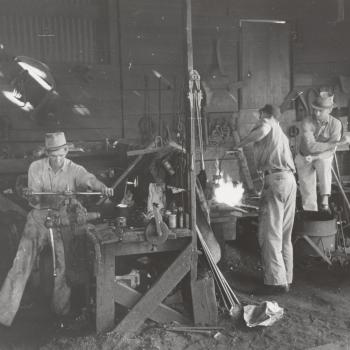The Working Catholic: Personnel Shortage by Bill Droel
Nearly every nursing home is understaffed. The shortage is not new, but Covid-19 makes it acute. Since 2020 facilities across the country have seen 420,000 employees leave. Employers have difficulty paying competitive wages because insurance reimbursement is inadequate. The nurses and aides on hand are older. They have an increased case load and longer hours. Morale suffers.
There are “several newly energized efforts to use robots and other technology to solve some of the problems in nursing homes and assisted living facilities,” reports N.Y. Times (4/21/22).
A robot, keep in mind, doesn’t need to resemble R2-D2. Robotics is just an expansion of technology already in use. Doctors now “visit” through a computer screen while monitoring devices remind patients to take pills and exercise. There are robotic lifters that assist caregivers who move frail elderly people. Among the latest is a robot that goes room to room to zap germs with ultraviolet light. A few nursing homes use a robot that brings food into the dining room and later clears the dishes. And of course, nursing homes use robots that sing or tell jokes. Today’s novelty item is tomorrow’s replacement worker.
There is a personnel shortage among Catholic clergy. There are about 37,000 priests in the United States, almost half of whom are over 70. Around 3,000 parishes lack a full-time priest. The number would be higher but for recent closures. The Catholic priesthood is not regenerating.
How has this crisis been addressed over these many years? Recruit priests from overseas, even though the ordination to baptism ratio is decreasing everywhere. Ask or require priests above retirement age to stay on the job. Pull priests away from teaching and administration into parishes. Ordain male permanent deacons. Try to find, train and retain professional lay ministers. Reduce Mass schedules and office hours. Lower the expectations of parishioners for an anointing of the ill or for pastoral guidance. Close parishes.
Bill Spielberger, an acclaimed civil rights attorney in Chicago, satirically suggests that Catholicism turn to robots. “Robots are cheaper than humans, don’t complain, and don’t form unions,” he says. “Given the growing shortage of priests maybe robots could deliver communion, ring bells, and hold the hands of the dying.”
Just as in health care delivery, Covid-19 has already accelerated the tech trend in Catholic parishes. Many have acquired equipment to broadcast Mass on the parish’s website or on You Tube. Several parishes plan to continue their broadcasts even if Covid-19 abates. A few parishes have a regular Zoom-chat with the pastor. Parishes promote automatic debit for donations (facilitated with computers). In some places marriage preparation is an impersonal tutorial accessed on one’s laptop. Will the next innovation will be robotic ushers, programmed with facial recognition and memory of each worshiper’s favorite pew? Will a driverless car and a robot make communion calls? Will robots fill in at sparsely attended parish meetings and events?
Catholicism betrays its dogmas if it uncritically embraces computer technology, robotics and the like. The dogma of the Trinity teaches us that our One God is revealed as an indivisible interpersonal community. Thus Catholicism is attuned to the divine found in personal encounter with the poor and struggling, with one’s spouse, among neighbors and friends. Technology cannot substitute for face-to-face connection.
The dogma of the Incarnation teaches us that God is manifest in the material world; that God uses a stable, fishing nets, mud, wine, bread, water and other humble things to display God’s love/grace. Thus Catholicism prizes the divine lurking in tangible objects and ordinary people. Catholicism is cautious about connections mediated through light-emitting diodes, transmitters, fiber-optic cables, social media platforms, touch screens and other cyber-technologies.
The trend of outsourcing ministerial responsibilities has already begun. Consultants roam chancery halls and bring their latest tech to parish offices. Will diocesan staff and parish leaders know when and how to return to personal ministry, to physical encounters free from technology? Or are we so blithely enamored with computers and robots that real preachers and ministers with real vocations disappear?
Droel edits INITIATIVES (PO Box 291102, Chicago, IL 60629), a print newsletter on faith and work.











